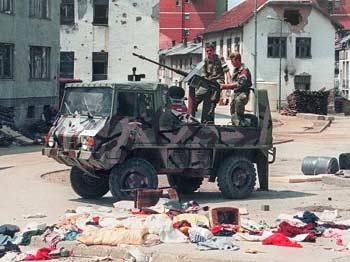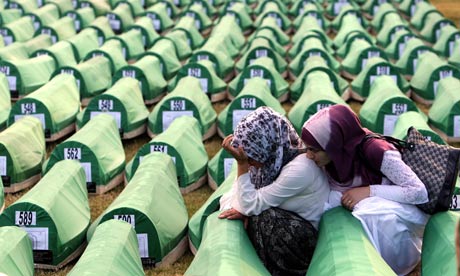The Srebrenica massacre, also known as the Srebrenica genocide, refers to the July 1995 killing, during theBosnian War, of more than 8,000 Bosniaks (Bosnian Muslims), mainly men and boys, in and around the town of Srebrenica in Bosnia and Herzegovina, by units of the Army of Republika Srpska (VRS) under the command of General Ratko Mladić. The mass murder was described by the Secretary-General of the United Nations as the worst crime on European soil since the Second World War.
 A paramilitary unit from Serbia known as the Scorpions, officially part of the Serbian Interior Ministry until 1991,participated in the massacre and it is alleged that foreign volunteers including the Greek Volunteer Guard also participated.
A paramilitary unit from Serbia known as the Scorpions, officially part of the Serbian Interior Ministry until 1991,participated in the massacre and it is alleged that foreign volunteers including the Greek Volunteer Guard also participated.

In April 1993, the United Nations declared the besieged enclave of Srebrenica in the Drina Valley of north-eastern Bosnia a "safe area" under UN protection. However, in July 1995, the United Nations Protection Force (UNPROFOR), represented on the ground by a 400-strong contingent of Dutch peacekeepers, Dutchbat, did not prevent the town's capture by the VRS and the subsequent massacre.

In 2004, in a unanimous ruling on the case of Prosecutor v. Krstić, the Appeals Chamber of the International Criminal Tribunal for the former Yugoslavia (ICTY), located in the Hague, ruled that the massacre of the enclave's male inhabitants constituted genocide, a crime under international law. The forcible transfer of between 25,000 to 30,000 Bosniak women, children and elderly which accompanied the massacre was found to be confirming evidence of the genocidal intent of members of the VRS Main Staff who orchestrated the massacre.

Theodor Meron, the presiding judge of the Appeals Chamber, stated:
By seeking to eliminate a part of the Bosnian Muslims, the Bosnian Serb forces committed genocide. They targeted for extinction the 40,000 Bosnian Muslims living in Srebrenica, a group which was emblematic of the Bosnian Muslims in general. They stripped all the male Muslim prisoners, military and civilian, elderly and young, of their personal belongings and identification, and deliberately and methodically killed them solely on the basis of their identity.

In February 2007 the International Court of Justice (ICJ) concurred with the ICTY judgement, stating:
The Court concludes that the acts committed at Srebrenica falling within Article II (a) and (b) of the Convention were committed with the specific intent to destroy in part the group of the Muslims of Bosnia and Herzegovina as such; and accordingly that these were acts of genocide, committed by members of the VRS in and around Srebrenica from about 13 July 1995.
The vast majority of those killed were adult men and teenage boys but the victims included boys aged under 15, men over the age of 65, women, and reportedly even several babies. The Preliminary List of People Missing or Killed in Srebrenica compiled by the Bosnian Federal Commission of Missing Persons contains 8,373 names,some 500 of them under 18, and includes several dozen women and girls. As of July 2011, 6598 genocide victims have been identified through DNA analysis of body parts recovered from mass graves and 5,138 victims have been buried at the Memorial Centre of Potocari.


In 2005, in a message to the tenth anniversary commemoration of the genocide, the Secretary-General of the United Nations noted that, while blame lay first and foremost with those who planned and carried out the massacre and those who assisted and harboured them, great nations had failed to respond adequately, the UN itself had made serious errors of judgement and the tragedy of Srebrenica would haunt the UN's history forever.
FRY was cleared of direct responsibility for or complicity in the massacre, but was found responsible for not doing enough to prevent the massacre and not persecuting the responsible, in breach of the Genocide Convention. Netherlands is also considered responsible for not preventing the massacre, due to presence of its UN contingent, and government of Netherlands acknowledged this symbolically by resigning over the issue, though no international rulings or cases concerning the issue have been considered, except in the case of individual victims suing Netherlands. In the Bosnia and Herzegovina v. Serbia and Montenegro case the International Court of Justice presented its judgment on 26 February 2007. It cleared Serbia of direct involvement in genocide, but ruled that Belgrade did breach international law by failing to prevent the 1995 Srebrenica massacre, and for failing to try or transfer the persons accused of genocide to the ICTY, in order to comply with its obligations under Articles I and VI of the Genocide Convention, in particular in respect of GeneralRatko Mladic. Mladić had been accused by the ICTY and was suspected of hiding in Serbia until his arrest there on 26 May 2011. source (wikipedia)
No comments:
Post a Comment